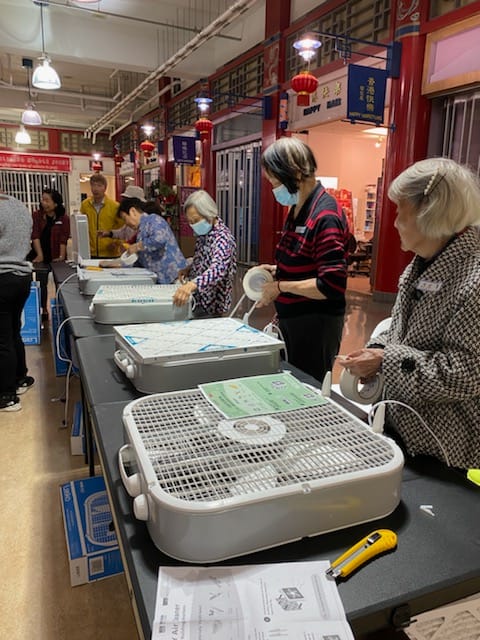DTES Chinese Advocacy NETWORK
Our Mission
We are a collective of staff from non-profit organizations whose individual work (either in part or in full) is oriented to supporting and fostering the well-being of low-income, Chinese residents who utilize DTES services. This Network aims to foster dialogue, relationships, and collaboration amongst its members so that they can collectively respond to emerging issues relevant to the DTES Chinese community and advocate for equitable solutions.

What We Do
We build capacity in the community and adapt to their needs by striving to be a strong base from which we can:
- coordinate services and programs within the DTES for low-income Chinese seniors,
- collectively act on neighbourhood-wide priorities that have been flagged as having equity oriented implications for the lives and wellbeing for the DTES Chinese community
- inform and/or respond to consultation requests from organizations / initiatives who are seeking to reach low-income Chinese residents who utilize DTES services, infrastructure and programming.
- cultivate a sense of collegiality and us-ness amongst staff who serve the same population of Chinese residents but are otherwise fragmented by organizational boundaries.
Background and Context
There are estimated to be over 2000 low-income Chinese residents who utilize services in the DTES, all of which have a unique set of intersecting identities which need to be considered when developing and delivering health and social services. Individuals from this population face multiple layers of interrelated and structural barriers; they are racialized; they are (for the most part) immigrants; they are (typically) linguistically isolated; they (often) have unresolved scarcity trauma due to surviving political turmoil and economic hardships in their home country; many have precarious housing conditions; and many are seniors with mobility issues. Taken as a complete whole, this population has a complex set of considerations that need to be taken into account in service delivery and neighbourhood planning.
There are not many professionals in the DTES however, that have the knowledge base, skills and community relationships needed to effectively work with this population. There is definitely an insufficient number of workers dedicated to the DTES Chinese population given its estimated size (which is likely an underestimation) and complex considerations. Moreover, the staff that are dedicated to this population are typically lone individuals in organizations whose mandate is weighted elsewhere. This leads to fragmented services, isolated professionals, and missed opportunities for advocating on community wide priorities. This network is being created within this context and is meant to help organize and cohere like-minded professionals in order to advocate for equitable services for the community.
Operating Principles
- Active participation and collective stewardship of this Network will be what makes it a strong body from which we can serve the community. We are committed to showing up for one another because we know that an active presence in this Network is a proactive investment for the health and wellbeing of low-income, DTES Chinese residents.
- We acknowledge that each organization represented in the Network has differing goals and objectives, and this Network is not a platform to advance the objectives of any one individual organization. Rather, we come together in the spirit of collaboration to build community capacity and address systemic challenges.
- We recognize that all participating members have a full workload within their home organizations and have limited bandwidth for additional priorities; as such, this Network is committed to keeping time and energy demands low and will only engage in activities which dovetail with the core functioning of members’ individual roles.
- This network is a coordinated body who will be both proactive in advocating for the inclusion of Chinese residents in community planning and services, as well as responsive to emergent issues in the community that require a coordinated response (e.g. COVID, warming centers, etc).
- Relationships are what enable nimble responses to collective needs, and as such, we invest and prioritize maintaining healthy relationships between staff in disparate organizations.
Operating Values
- Commitment to prioritizing attendance and showing up for one another in Network functioning.
- Patience and persistence in building a strong Network so that it can be mobilized in service of its community.
- Transparency in strategy, management, and operations within the Network
- Mutual respect for one another core responsibilities within each others home organizations
- Advocacy for senior’s autonomy, agency, and holistic well-being
Membership and Roles
Membership is comprised of individuals from a variety of professional identities – service provision, programming, administration, organizing, advocacy, activism – each of which brings a unique set of skills to bear in this service work and will be valued equally within the network.
Core membership is open to staff from non-profit organizations who have core responsibilities to address the health and well-being needs of low income Chinese residents of the DTES, either because of the organization’s formal mandate or because Chinese residents frequent their services.
Roles:
- Co-chairs for the Network will be appointed by vote and their term will be two years in length
- A coordinator will be employed to liaise with the co-chairs to ensure the smooth functioning of the group
- New members are invited based on group consensus
The Chinatown Response Network will offer affiliate membership to Chinese speaking staff from non-profit organizations who have an interest in engaging more with low income Chinese residents of the DTES. Affiliate membership ensures the CRN is rooted and connected to the larger DTES community. Affiliate members will be invited to community celebrations, networking events, and can flag interest in participating in the core membership committee if their work is becoming more focused on low income Chinese residents.
2024 Member Organizations
- Carnegie Community Centre
- RayCam Co-operative Centre
- SRO-Collaborative
- Vancouver Second Mile Society
- Yarrow Intergenerational Society for Justice
